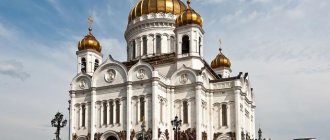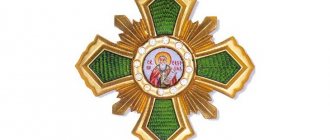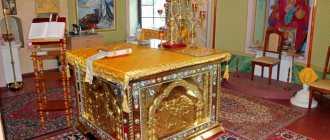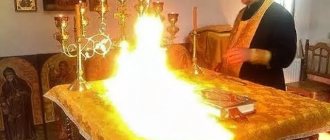Servants Reading Scripture in the Temple
The sounding word was of great importance in worship already in Old Testament times. That is why the ministers who read it are mentioned more than once in the texts of the Bible. Thus, upon his return, the book of Nehemiah, governor of Judah, under whom the restoration of Jerusalem began, mentions the names of at least 13 law-readers “and Levites,” also servants of God, who read the commandments before all the people, explaining each one, “and the people understood what they read” ( Nehemiah 8:7-8).
A reading of the words of the prophet by the Lord Himself can be considered a kind of sanctification of this church office. Isaiah during the prayer meeting of the Nazareth synagogue (Luke 4:16):
“And he came to Nazareth, where he had been brought up, and entered the synagogue, as was his custom, on the Sabbath day, and stood up to read.”
The words of the Evangelist “as usual” may perhaps indicate that even before the start of His sermon, Christ read more than once during synagogue meetings. The Gospel of Luke also conveys to us the usual duty of the reader to interpret what he reads:
“And he closed the book and gave it to the servant, and sat down; and the eyes of all in the synagogue were fixed on Him. And He began to say to them, “Today this scripture has been fulfilled in your hearing.” (Luke:4:20-21).
The meaning of the word psalm-reader
Examples of the use of the word psalmist in literature.
And to the sound of the consecrated bell, led by the bearer of the crucifix, followed by psalm-bearers, censer-bearers, reliquary-bearers, readers, gatekeepers, deacons and subdeacons, advanced the sacred procession of mitred abbots, priors, abbots, monks and brethren of the mendicant orders: the monks of Benedict of Nursia, the Carthusians and Camaldulians, Cistercians and Olivetans, Oratorians and Vallombrosans, Augustinian brothers, Brigittines, Premonstrans, Servites, Trinitarians and children of St.
The owner of the house, a psalm-reader, sang irmoses behind a thin wall and played along on a crappy violin.
And to the sound of the consecrated bell, led by the bearer of the crucifix, followed by psalm-bearers, censer-bearers, reliquary-bearers, readers, gatekeepers, deacons and subdeacons, advanced the sacred procession of mitred abbots, priors, abbots, monks and brethren of the mendicant orders: the monks of Benedict of Nursia, the Carthusians and Camaldulians, Cistercians and Olivetans, Oratorians and Vallombrosans, Augustinians, Brigittines, Premonstrans, Servites, Trinitarians and the children of St.
Petrukha Khodnev helped the short, puny, wrinkled psalm-reader with a grayish braid, like a dry apple, pull out of the church a pot-bellied, heavy lectern covered with black cloth.
Before the service, the psalmist, guided by the Typikon or calendar instructions, combines the texts of the Menaion and Triodeus.
From the house to the kitchen, where the orderly Gudkov was stationed, and from the kitchen into the house, the psalm-reader’s pregnant wife walked across the yard, belly first, with a colorful scarf on her head, and a young, guilty, gray face with yellow spots.
In the direction of the Vyatka Theological Seminary, Konstantin went to Kotelnich, where he was assigned to the place of psalm-reader at the Kotelnich Trinity Cathedral.
They tried plum Easter with all sorts of candied fruits, and then they tried Easter cake at the psalm-reader’s, even Domna Panferovna was offended.
He talked with a certain gloomy Socialist-Revolutionary, who was mostly busy playing checkers and stuffing cigarettes, on various abstract topics, and from him he went to a cafe with a garden, where a pockmarked psalm-reader loved to beat the French at bowling pins, and began to pester him with the same questions.
It would seem that the teacher did not leave the executioner any work at all,” added the psalmist, “but still something fell to the lot of Mr. Tong.
“And I would slash each of you in the throat and ruin your Sunday nasal trill, sir psalm-reader,” Lambourn declared fiercely.
The elderly deacon refused to serve with him, and he was helped by a psalm-reader, a dirty and lonely old man, who had long ago been deprived of the deacon's rank for drunkenness.
Actually, for the priest, the psalm-reader, who was also the watchman, lit one stove, and at its open door, squatting, Fr.
Two people worked: the psalm-reader Nikon, who took sand for the church, and the elder’s worker, Semyon Mosyagin.
Tell me another time,” answered the psalm-reader with a lazy and vague threat, and while he spoke, the smoking pipe hung from his mouth onto the gray stubble of his chin and tapped.
Source: Maxim Moshkov library
The "Ministry of the Evangelist" of the Ancient Church
The duties of these clergy in the first centuries of the existence of the Christian Church were structured in the same way, but they did not read the Gospel “in the ears of the people.” Also, readers:
- kept church books;
- lamps were lit; they were carried before the priests during certain moments of the service.
This is how the monument of the first centuries of the Church, “Apostolic Constitutions” presents the requirements for those appointed to this position:
“Let the reader be appointed... after he has been thoroughly tested to see whether he is talkative, drunkard, funny, well-behaved, well-behaved, prudent, first to come to the Lord's assemblies, well heard, able to explain, knowing that he is fulfilling the ministry of an evangelist , for whoever fills the ears of those who do not understand will be considered registered with God.”
And sschmch. Cyprian of Carthage, like many Christians, believed that being appointed to this position meant recognition by the Church of even the feat of confession. For example, he ordained Aurelius and Kelerinus, known for the firmness of their faith, as well as for the torments they endured from the pagans.
Who is a reader in Orthodoxy
Now this degree of initiation is considered the first, the lowest for clerics. Next is the ministry of subdeacon.
How does initiation take place?
The ministry is received through the laying on of hands by the bishop. The initiation is called chirothesia, which literally means "position of the hand." Unlike the ordination of a priest or deacon, it takes place in the middle of the church, and not in the altar. The order of rank is as follows:
- the bishop places his hand on the head of the dedicatee, reading a prayer for his enlightenment with Grace; the choir sings troparia to the Apostles, as well as St. John Chrysostom, Basil the Great, Gregory Dvoeslov;
Interesting fact
These saints are not just authors of liturgical texts: two of them, St. Vasily and John themselves began their ministry as readers.
- then the bishop tonsures the hair of the dedicatee in a cross shape in the Name of the Holy Trinity;
St. Simeon of Thessalonica explains this action this way: “The removal of hair marks dedication: because hair is the branch and, as it were, the color of the whole body, and brought by a person to God, they mark the beginning of his complete donation of himself to the service of God. They are tonsured crosswise in remembrance of Jesus Christ, Who sanctified the universe by His incarnation and crucifixion on the cross. “He is tonsured in the name of the All-Holy Trinity because the triune God is the Creator and Finisher of everything.”
- the person being initiated is placed in the likeness of a priest’s robes, a phelonion, but short, according to the word of St. Simeon of Thessalonica, “the firstfruits of priestly garments”;
- the concluding prayer of the bishop follows, after which the beginning of the service of the initiate is marked by his reading of a short passage from the Apostle.
Saints who served in this field
In addition to the saints who began their service with this degree of dedication, but were glorified in a different rank, today the Orthodox monthologist knows 12 saints of God who labored as church readers until the end of their earthly lives. Among them:
- martyr Alpheus of Caesarea; during the persecution of Emperor Diocletian (beginning of the 4th century), he not only confessed his faith, but fearlessly convinced the pagans to abandon their errors, for which he was killed;
- martyr Timothy, who suffered during the same persecution with his wife Maura, whom he persuaded to confess her faith; the saints were crucified on crosses, where they remained alive for 9 days, continuing to teach about the Lord;
- New Martyr Evgeny Dmitrev; He served as a psalm-reader at a rural church in the Ryazan province, then went to Perm, where he worked at a factory.
August 31, 1937 St. Evgeny was shot for professing the Christian faith.
The Church does not have “high” or “low” ministries; you can acquire grace by being at any degree of dedication. An example of this is the humble service of the reader, sanctified by the holiness of many believers, even the Lord Himself.
Natalia Sazonova
About spiritual education in Ulyanovsk
At the end of summer - beginning of autumn, people involuntarily think about studying. If everything is clear for children and teenagers with spiritual education - they are expected to attend Sunday schools, then with adults - no. More than a hundred years have passed since the closure of the seminary and theological school; higher education in the field of theology can only be obtained at the Department of Theology at Ulyanovsk State Pedagogical University. However, the Simbirsk diocese gives those who wish to study the opportunity to learn more about the faith at diocesan courses. We'll tell you more about them.
Catechetical courses
The project is designed to prepare qualified Sunday school teachers, catechists and missionaries. However, attending classes is useful for anyone who wants to learn more deeply about the doctrine and strengthen their faith.
During their studies, students will listen to lectures on the Holy Scriptures of the Old and New Testaments, Catechism, Liturgics, Theological Anthropology, Church History, Rhetoric, Logic. In addition to theoretical training, course participants will undergo summer internship at the parishes of the Simbirsk diocese. It consists of conducting public conversations for people who want to accept Holy Baptism and become godparents.
The group accepts lay people who have completed secondary education. Admission is made after an entrance interview. The courses last for two years. Classes are held twice a week in the evening. Graduates receive diocesan diplomas. Classes are held in the spiritual and educational center at the address: Ulyanovsk, per. Outpatient, 8.
Training is free. Sign up by phone: 8-8422-43-34-23, 8-908-475-86-90 – Nadezhda Alekseevna.
Priest Daniil Gasnikov, head of the diocesan department of religious education and catechesis: Six years ago, His Holiness the Patriarch noted that in addition to priests, lay people should also take an active part in the life of the Church. Catechetical courses prepare those active parishioners who would like to work in Sunday schools, in the field of social work, in the work of catechumens - conversations about faith with those who want to become a member of the Church of Christ, a godfather or mother. Graduates of catechetical courses have ample opportunities to apply their knowledge in our churches. Despite the fact that many graduates are already actively working, there are still not enough catechists. We are waiting for interested parishioners who, having received knowledge about the doctrine, will want to pass it on to more people
“Fundamentals of Orthodox culture and Orthodox pedagogy”
The curriculum of the direction provides for the study of the Holy Scriptures of the Old and New Testaments, the Divine Service Rules, the Patristic work, Liturgics, the History of Church singing, church historical and religious disciplines.
The course is open to everyone aged 18-65 years. The duration of training is eight months. Training takes place three times a week in the evening. No pedagogical education is required for admission. If you have a pedagogical education, the graduate of the course has the right to teach the Fundamentals of Orthodox Culture not only in Sunday schools, but also in general educational institutions.
Graduates receive a diocesan certificate of additional education or a certificate of training.
Classes are held in the spiritual and educational center.
Training is paid. Make an appointment by phone: 8-905-349-19-88 – Marina Vladimirovna.
Sergei Nikolaev – head of the diocesan youth department, graduate of the course:
You can gain a lot during your studies. Firstly, unique knowledge. Since a number of disciplines are taught by priests, they share not only academic information, but also their own observations and experiences. Secondly, graduates receive a certificate - it will allow them to engage in teaching activities in Sunday school or conduct educational classes for students at schools or universities. Thirdly, an unusual experience. Some will discover the city from a new side thanks to the excursions of local historian Olga Novosad, others will get acquainted for the first time with such a document as the Social Concept of the Russian Orthodox Church, which reveals the Church’s position on a number of important and frequently asked questions, and some will understand that the course is only the first stage of his education.
"The Charter-Psalm-reader"
Training takes place in the following areas - Reader, Charter-Reader, Church singer, Psalm-reader. Qualification is awarded based on the results of a comprehensive final exam. Musical education is not required for admission. In addition to voice singing and everyday life, students study Solfeggio, Fundamentals of Church Singing and Conducting. During the course, you have the opportunity to study vocals and play the piano individually. Graduates receive diocesan diplomas.
The training lasts two years. Classes are held three times a week in the evening in the spiritual and educational center.
Training is paid. Make an appointment by phone: 8-905-349-19-88 – Marina Vladimirovna.
"Regent"
The course is a continuation of the “Instagram-Psalmist” curriculum. In addition to narrowly focused disciplines, students study the Liturgical Charter, Church Slavonic language, Voice singing, Lifestyle, Solfeggio, Vocal, Piano, and basic theological disciplines. Graduates receive diocesan diplomas. Music education is required for admission. The training lasts one year. Classes are held three times a week in the evening in the spiritual and educational center.
Training is paid. Make an appointment by phone: 8-905-349-19-88 - Marina Vladimirovna.
Priest Vladimir Manyakov, head of diocesan courses:
If you want to gain basic knowledge about the Orthodox faith, come to the course “Fundamentals of Orthodox culture and Orthodox pedagogy,” where you have the opportunity to study the basics of religious doctrine, liturgics, Church Slavonic language, and sectology. In the modern information space, it is extremely important for every believer to know his faith, keep it pure, and be able to give an answer to “everyone who asks you to give a reason for the hope that is in you” (1 Pet. 3:15).
The courses, of course, do not provide such a fundamental education as a seminary, but they allow you to touch the tip of the iceberg called “Orthodoxy.” This is important because the people who now come to church were raised, in the vast majority of cases, outside the spiritual tradition.
If you want to work in the Church as a reader, singer or psalm-reader, know the Rules, be able to compose a service and understand it, choose practical directions: “Rule-Psalm-reader” or “Regent”. Learning to read Church Slavonic correctly is the minimum we can give. However, a lot depends on the diligence of the students. It is not easy to study in these areas, but those who stay to the end will acquire a skill with which they can serve the Church.
If the implementation of the first two directions is the fulfillment of the commandment to love God, then studying on the “Sister of Mercy” course is the commandment to love one’s neighbor. With students we analyze the specifics of spiritual, mental, and physical illnesses. They practice in hospital departments and hospice.
“Sister of Mercy” on the basis of the Medical College of IME and FC UlSU
The courses are open to everyone who has completed the ninth and eleventh grades. This direction is an additional spiritual educational program to secondary vocational education. Sisters of mercy study theological disciplines, such as: Holy Scripture of the Old and New Testaments, Liturgics, Moral Theology, Catechism and others.
Graduates receive a diocesan certificate of additional education.
The duration of training for ninth grade graduates is three years and ten months. For those admitted after the eleventh grade, it is two years and ten months.
Classes are held at the Ulyanovsk State University Medical College at the address: Ulyanovsk, st. Ablukova, 31.
Training is free. The curator of the direction is the head of the diocesan department for relations with healthcare institutions, Priest Dimitry Subbotin.
"Sister of Mercy" (senior corps)
The courses are open to everyone aged 18-65 years. In addition to lectures, students undergo practical training in hospices and city hospitals. Graduates receive a diocesan certificate of additional education. The study lasts eight months.
Classes are held in the educational hall.
Training is free.
Why should a child be sent to Sunday school?
Svetlana Kozyreva, director of the Blagovestnik Sunday school at the Annunciation Church in Ulyanovsk, answered this question:
Sunday school is a specially organized educational space where a child can gain knowledge about the Orthodox faith in an accessible form. It is no secret that even deeply religious parents find it difficult to explain to their child, for example, the meaning of a church holiday. In addition, children get acquainted with the Church Slavonic language, which helps them understand the meaning of worship and prayers, learn church singing and handicrafts, and this contributes to the full and harmonious development of the individual.
At Sunday school, a child receives communication with peers and like-minded adults who try to keep the commandments and set the right examples in various everyday situations, that is, they do not teach “bad things.” From work experience, I can say that in Sunday school not only children find friends, but also adults begin to become friends with families and go through life together, helping and supporting each other.
At Sunday school there is an atmosphere of love and friendship; everyone is accepted here and everyone is welcome. They always strive to understand and help, so adults and children feel comfortable.
And if you want not only to give knowledge to your child, but also to gain experience of joint interaction among believers, you want your child to learn to love, understand other people, appreciate parents and help others, then come to our Sunday school!
Enrollment in Sunday schools of the Simbirsk diocese
Enrollment of children aged 6 to 14 years in Sunday schools of the Simbirsk diocese for the 2021-2022 academic year is announced. Students receive knowledge on the Law of God, Sacred History, Church Slavonic, the basics of choral and church singing, Christian ethics and other subjects, take part in competitions, Olympiads, festive events, and pilgrimage trips. During the summer holidays, children relax in Orthodox-oriented groups of health camps.
Classes will begin in September and will be held on weekends.
Registration is open in 30 Sunday schools of the Simbirsk diocese:
- High School "Blagovestnik" at the Annunciation Church , Ulyanovsk, st. Sholmova, 18, tel. 8-902-005-77-00 (Kozyreva Svetlana Anatolyevna).
- Higher School of the Resurrection-Germanovsky Church , Ulyanovsk, lane. Gogolya, 11, tel. 8-927-987-41-15 (Dzhevatoglu Ekaterina Evgenievna).
- Higher School of the Mother of God-Neopalimovsky Church , Ulyanovsk, lane. Outpatient, 8, tel. 8-917-613-65-07 (Arkhangelskaya Tatyana Vladimirovna).
- Higher School at the Epiphany Church, Ulyanovsk, p. Arskoe, st. Mira, 12, tel. 8-986-736-84-54 (Maksimova Svetlana Vasilievna).
- Higher school "Zernyshko" of the Spaso-Voznesensky parish , Ulyanovsk, st. Ulyanovskaya, 2, tel. 8-937-271-81-21 (Kuptsova Tatyana Valerievna).
- VS “Guiding Star” of the Vladimir courtyard of the convent in the name of the Archangel Michael in the village of Komarovka in the city of Ulyanovsk, Ulyanovsk, st. Volzhskaya, 50 A, tel. 8-917-635-75-30 (Vera Ivanovna Zheltysheva).
- High School “Solnyshko” at the Holy Spiritual Church , Ulyanovsk, st. Vorobyova, no. 8, tel. 8-960-367-77-35 (Barsukova Oksana Nikolaevna).
- Higher School at Sretensky Church , Ulyanovsk, st. Repina, 37, tel. 8-917-616-05-17 (Kotnekova Vera Alekseevna).
- High School "Candles" of St. John the Baptist Parish , Ulyanovsk, st. Khrustalnaya, 3 V, tel. 8-902-582-37-16 (Reizbikh Olga Vladimirovna).
- Higher School at St. Nicholas Church , Ulyanovsk, Ave. Aircraft manufacturers, 28, tel. 8-927-271-00-02 (Anikina Natalya Yuryevna).
- Higher School at the Church in the name of the Great Martyr and Healer Panteleimon , Ulyanovsk, st. Krasnoproletarskaya 1 A, tel. 8-917-053-30-09 (hieromonk Savva (Markov)).
- Higher School at the Church in the name of the Apostle Andrew the First-Called , Ulyanovsk, Vracha Surov Avenue, 4 B, tel. 8-917-634-60-77 (Mamonova Rita Aleksandrovna).
- Higher School at the Nativity Church , Ulyanovsk, st. Rossiyskaya, 121, tel. 8-902-215-79-25 (Bykova Zoya Ivanovna).
- Higher School at the Church of the Nativity of the Mother of God , Ulyanovsk, st. Kamyshinskaya, 28 A, tel. 8-917-612-33-68 (priest Zechariah Bobrov).
- Higher School of the Spassky Monastery , Ulyanovsk, st. Dvortsovaya, 4, tel. 8-927-822-98-36 (Nurtdinova Tatyana Rakhimzyanovna).
- VS "Holy Spring" at the Resurrection Church, p. Undory , st. Zaovrazhnaya, 1 B, tel. 8-964-859-26-94 (Archpriest Andrei Belavinsky).
- VS at the temple in honor of the icon of the Mother of God “Joy of All Who Sorrow” , r.p. Isheevka , st. Ulyanova, 12, tel. 8-917-609-22-03 (Vorontsova Valentina Sergeevna).
- VS at the Church of the Nativity of the Mother of God , p. Poldomasovo , st. Truda, 72 A, tel. 8-927-837-12-61 (Sivkova Elena Viktorovna).
- VS at the Church of the Intercession , p. B. Klyuchishchi , st. Mira, 17 A, tel. 8-927-814-39-46 (Kalenkova Olga Sergeevna).
- Higher School at the Trinity Church, Novoulyanovsk , st. Ulyanovskaya, 24 A, 8-906-144-44-97 (Maslova Yulia Aleksandrovna).
- VS at the temple in honor of the icon of the Mother of God “Joy of All Who Sorrow” , p. B. Nagatkino , st. Sovetskaya 16, tel. 8-917-052-65-62 (Olga Vladimirovna Prisyazhnyuk).
- VS at the temple in honor of the icon of the Mother of God “Joy of All Who Sorrow” , r.p. Karsun , st. Pushkina, 16, tel. 8-937-272-05-90 (Otryaskina Larisa Aleksandrovna).
- School "Bee" at the Assumption Church, Krasnoselsk , st. Zheleznodorozhnaya, 2 A, tel. 8-937-277-37-03 (Kuzhakova Elena Olegovna).
- School "Svechechka" at the Transfiguration Church, r.p. Novospasskoye , st. 70 let Komsomol, 1 A, tel. 8-927-617-01-44 (Barsukova Tatyana Aleksandrovna).
- VS at the Trinity Church, p. Trinity Sungur , st. Bazarnaya, 76, tel. 8-937-881-84-78 (Shcherbachenko Margarita Nikolaevna).
- VS "Spiritual Origins" at the temple in honor of the Kazan Icon of the Mother of God, r.p. Maina, st. Polbina, 3, tel. 8-927-271-85-64 (Kirillina Anna Anatolyevna).
- VS at Trinity Church, r.p. Tsilna, st. Simbirskaya 1 A, tel. 8-960-377-63-14 (priest Boris Katruk).
- VS "Spring" at the temple in honor of the icon of the Mother of God "Joy of All Who Sorrow", p. Old Algashi, st. Pionerskaya, 5, tel. 8-927-988-44-81 (Ponomareva Galina Vasilievna).
- Higher School at St. Nicholas Church, r.p. Surskoye , st. Sovetskaya, 23, tel. 8-906-391-71-54 (Archpriest Dimitry Ponomarev).
- VS “My Joy” at the temple in the name of St. Seraphim of Sarov, r.p. Kuzovatovo , Mr. "Lesnoy", no. 26, tel. 8-927-805-32-19 (Archpriest Sergius Aristov).
No. 16 (552) August 25, 2022




